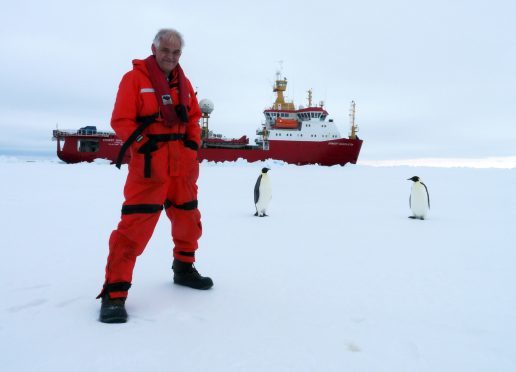A leading polar scientist who is credited with helping to map Antarctica and has worked with the French Space Agency has retired.
Prof David Meldrum, a Research Fellow at the Oban-based Scottish Association for Marine Science (Sams), studied the Arctic and Antarctic regions for nearly 50 years.
His outstanding contribution to UK polar research was recognised in 2012 when he was awarded the UK Polar Medal at Buckingham Palace.
Between 1974 and 1979 he was a key part of an airborne Radio Echo Sounding programme in Antarctica that for the first time identified internal layering and the configuration of land surface beneath the ice.
In 1978 Prof Meldrum joined Sams (then known as Dunstaffnage Marine Laboratory) and helped to develop technical innovations still in use today in polar research and oceanography, such as drifting buoys, GPS navigation, smart sensors and satellite communication systems.
Prof Meldrum, who is credited with laying the foundations for Sams’ Scottish Marine Robotics Facility, said: “I have been very fortunate to be able to enjoy a career that has taken me to the ends of the earth, and has allowed me to work with amazing people here at Sams and elsewhere. It is marvellous to have been honoured and decorated for having had a career that was a lot of fun.”
The St Andrews and Cambridge graduate is the author or co-author of more than 100 papers in glaciology, oceanography, satellite communications and technology development.
He is a leading designer of modern, smart, low cost communications units for use in polar regions and these continue to be deployed. His expertise led to him becoming chairman of the Data Buoy Co-operation Panel of the Intergovernmental Oceanographic Commission and World Meteorological Organisation (IOC/WMO) between 2004 and 2009.
In 2013 Prof Meldrum, who lives in Taynuilt, was made a Fellow of the Institute of Physics and a professor of the University of the Highlands and Islands.
Sams Director Prof Nicholas Owens said: “It is clear that the range and depth of David’s experience and expertise in both polar regions mark him out as having made a hugely significant contribution to our knowledge.
“This has been through classical expeditions, technological innovation and a legacy of data collection that will continue to reveal the secrets of the polar regions for decades to come.”
While at Sams, Prof Meldrum spent two years on secondment at Collecte Localisation Satellites (CLS) Argos in Toulouse, part of the French Space Agency (CNES).
